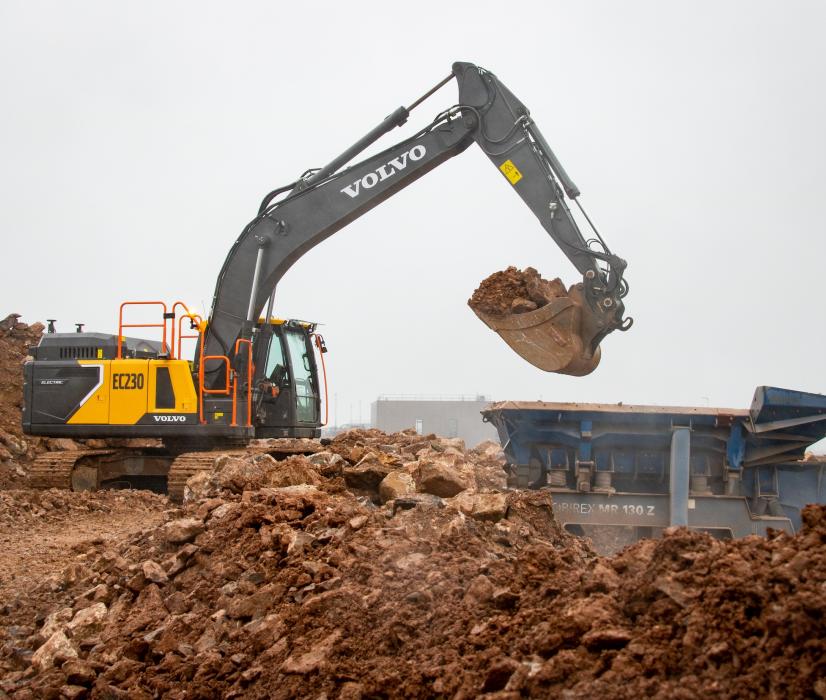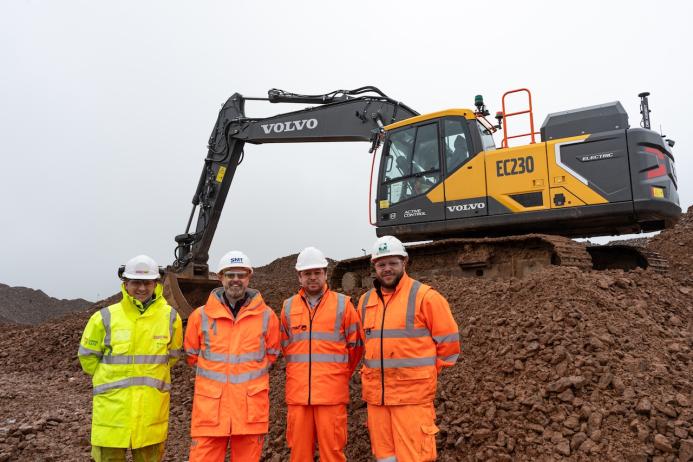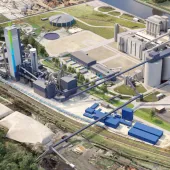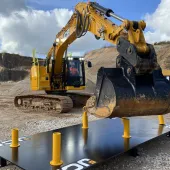First Volvo EC230 Electric in UK powers up airport project
Electric excavator gets off to a flying start with Chepstow Plant International at Bristol Airport
IN its first live UK demonstration, the EC230 Electric excavator from Volvo CE proves it can deliver a powerful performance on the toughest of tasks. The zero-exhaust emission construction machine has been put to work by Chepstow Plant International as part of a large-scale public transport interchange transformation for Bristol Airport.
The project, made possible through a collaboration with Volvo dealer SMT in Great Britain, has been instrumental in helping all key players analyse the ways of working, infrastructure, and enabling conditions needed to support the use of electric machines – while also putting the EC230 Electric through its paces. As a result of its ability to match heavyweight strength with a more sustainable operation, Chepstow are in active discussions to add the 23-tonne excavator to their fleet of Volvo machines.
Ross Hayward, head of assets and commercial at Chepstow Plant International, said: ‘We see this as the first step in our long-term objective to transition away from diesel power, which is why we welcomed the opportunity to work alongside SMT and Volvo CE, as preferred partners on our decarbonization journey.
‘We see a continuous stream of ambition from both customers and suppliers to pursue the sustainability agenda, with mobile plant being a key cornerstone of those ambitions. Initiatives like this are essential in assessing decarbonization plans, both on a company and sector level.’
The seven-week demonstration was part of a new interchange project for Bristol Airport, to help improve accessibility and public transportation links to and from the airport – with a key focus on sustainability. The airport is already committed to achieving net zero for its own operations by 2030 and working with its entire value chain to reach net zero by 2050.
Hannah Pollard, head of sustainability at Bristol Airport, said: ‘The trial with Volvo’s EC230 Electric excavator, in collaboration with Chepstow Plant, supports our sustainability goals to work with our entire value chain to reduce indirect emissions. Using more zero-emission solutions and sustainable fuels with vehicles on site, is just one of the many initiatives we’re implementing across our business to achieve this target.’

A key part of the project was to put the 23-tonne electric machine to the test across a range of functions to learn its full capabilities and understand how to support its optimum use. The EC230 Electric was tasked with loading the crusher through to more challenging jobs such as moving and breaking up large rocks. While runtime varies across every project depending on a number of factors, the versatile machine maintained power on the medium-duty tasks for up to 6h a day. Meanwhile, fulfilling the heavy-duty tasks – an application much more suited to a larger machine of around 30-tonnes – required a recharge after about 2.5h.
Operator Nathan Miller, earthworks supervisor for Chepstow Plant International, noted that the machine’s performance was on a par with diesel, adding: ‘In fact, there’s more instant power with electric, so in that sense it’s brilliant. It’s great to be one of the first operators in the country to drive the EC230 Electric.’
To ensure he could maintain maximum power without an impact on his working day, Mr Miller took advantage of a fast charge during his breaks using a 150kW Kempower unit, as well as a slow charge using the AC overnight charger.
Kieron Davies, site agent at contractor Griffiths, said: ‘The low noise and vibrations have been well received by operators as a way to enhance their health and well-being in a work environment. We have also seen a boost in recruitment operations and retention with many employees wanting to be involved in projects like this that engage with the latest technologies.’
The project has served as a useful learning experience for both SMT and Chepstow and proved the importance of planning, particularly around the preparations and charging infrastructure needed for the site. Any early challenges were resolved with assistance from SMT, demonstrating the need for dealer support at every stage of the project to smooth the transition to electric.
Shaun Sisterson, electromobility business manager for SMT GB, said: ‘The main learnings have been that collaboration is key and planning is absolutely vital. We cannot just hand over the machine and let the operator get on with it, especially if customers are just starting out on their electric journey. We understand the need to prepare the customer and support the project throughout – and when we do, we show that it’s possible to operate and perform in exactly the same way that a diesel machine would.’
Ross Hayward added: ‘For those who are used to driving electric vehicles, the transition from diesel to electric excavators is no different. It requires a bit more planning, but after you get used to it, it becomes just another part of your everyday site routine.’
Never afraid to be the first to test new solutions, Chepstow say they have enjoyed a fruitful relationship with SMT and Volvo CE that has helped lead the way in construction innovation. Their commitment to increasing safety and productivity has seen them benefit from a range of pioneering Volvo solutions, which have helped to reduce idle time across their sites by 11% and increase operational efficiencies by 9%.
Once again, with this latest project, like-minded collaboration has proved essential in driving real change. The project has not only helped navigate the conditions needed for a reliable electric ecosystem, but has also paved the way towards carbon-neutral construction for others to follow.









